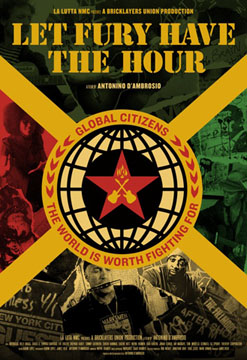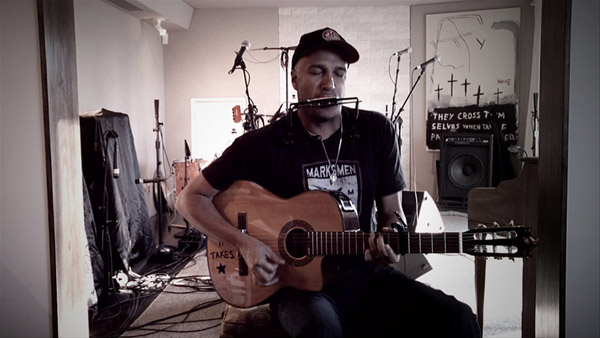
"Capitalism is not natural, it's just brainwashed into us," Antonino D'Ambrosio, director and producer of Let Fury Have The Hour, a documentary of art as a political statement, as a "creative response," tells me in the foyer of Tribeca's Cadillac Lounge. "Dialogue is the beginning of change," Antonino says and turns to his publicist who brings him a vegetarian sandwich.
In his first feature documentary, Antonino goes back thirty years to the cultural resistance of the Reagan-Thatcher 1980s, "when America changed forever." He features dozens of mavericks of thought, science and humor: artists, environmentalists, entrepreneurs and futurists, including semi-legends like Wayne Kramer and John Sayles, all brilliant left-wing counter-culture charming motherfuckers. After fifty or so interviews, I was mesmerized. I was hungry for more. Antonino's documentary guests left little unchallenged: From our collective apathy, to our acceptance of hierarchy in politics and capitalism, all the way to religion, all the way to the top -- "How can there be God? God struck Haiti when there's Las Vegas?"

"Antonino, talk is cheap," I open. "Had I lived in Bushwick, the way your publicist's been changing our appointment every twenty minutes or so, we'd never have this chat. I need to afford to live in Manhattan to talk to you right now."
"That's our discussion then," Antonino smiles.
"Fine by me. Tribeca branched out to Qatar, not to Redhook," I point.
He rolls his eyes but refrains to: "I'm Italian, you're Greek. Our DNA's are not that different. We can use art as a trigger to think about challenges like this one creatively." Antonino talks fast biting into his sandwich. "Art opens doors through metaphors. Creates a new emotional reality."
"In your documentary one of your guests says that the notion of no alternatives is what keeps shitty governments in place," I say.
"Isn't that amazing?" Antonino responds proudly.
"Worked in my country, for 30 years now," I smile. "But in one of your closing testimonies it's argued that just asking the right questions is pretty much all that matters."
"Music, art, can politicize us. They can make us challenge the givens and bring up alternatives. I believe in that."
"Well, I do and I don't," I say. "I'm fascinated by scenaristic thinking. I have to. I studied decision sciences for Christ's sake" -- a laugh spurts out of me -- "but at the end of the day we adopt one alternative, there is one reality. My father will either afford his prescription pills or not."
"Intelligence is what separates us from animals. My documentary is about finding intelligent outlets for our anger," Antonino answers come out automatic, rehearsed.
"Intelligence, for me, signals the end of life," I counter. "Look how low intelligence species, one-cell organisms surviving for billions of years. Then look at the damage the smartest people have contributed to in the last century alone: environment, war, religion, white collar, even nuclear damages -- everything you list in your feature. Clearly intelligence seems pretty risky for life."
"I don't know about that," Antonino leans forward. "You are talking about mistakes of the establishment. Change comes from the outsider. From grassroots movements."
"You are an Italian," I smile. "You're an optimist."
"I have hope, which is different from optimism. I can work towards a creative response and that's work worth doing."
Is this propaganda? I'm getting impatient, Greek. I want specificity, solutions. "Did you see Headshot?" I ask referring to Pen-ek Ratanaruang's movie in Tribeca? Antonino has not. "In Headshot, Dr. Demon believes that survival of the fittest worked well for millions of years, it's in our genes. Nature has no justice. If you want justice you have to take invasive, radical action," I say and it's my turn to raise my eyebrows. "So I want some answers. If you don't take the gun, like Dr. Demon did, do you believe in gene therapy?"
"That fascinates me. I want to learn more about gene therapy, but right now we don't need to be that invasive. Political art impacts our consciousness, it can change our votes. It redirects anger. Maybe you start by not getting drunk, or not terrorizing the immigrants."
I offer Antonino the same four choices about the Greek youth, currently deadlocked in poverty and corruption, that I've offered to directors in the festival -- all of the choices demonstrated in different Tribeca movies this year. Flee (Una Noche), fight back (Headshot), give in (Unit 7) or give up? (Wasted Youth, screening in the shadow of the festival.)
"This is a hard question because there is despair in Greece," Antonino says. "And yet my documentary introduces a fifth one: creative response via dialogue through art. Maybe you tell a story and start a new movement."
"Fine. So who gets to tell the stories?" I ask. "Which, by the way, was one of the most interesting questions in your documentary. And more importantly, who gets to tell stories that people will listen to? Any idea is as powerful as its followers on Twitter," I joke, but not really.
"Ioannis, we found Greek graffiti in Nazi camps. You start guerilla and move on. In the '70s the rock scene was pure establishment. Then indie labels showed up because kids wanted to express their anger, which led to punk, and hip hop and so on all the way to... occupy Wall Street. It will take time."
Dr. Demon-in-me smiles. Thirty years of fury? Then I think of today's "Holly-valley" kids. They tell stories in completely different ways from me or Antonino. Random Adventures of Brandon Generator's multimedia allows the audience to influence the story outcome. Maybe Antonino is onto something. Maybe I'm too blind or too old to get what 2012-grassroots means, and its potential. How about we write a story about Greece and let the Greeks finish it? "Are you on Facebook?" I ask Antonino excited.